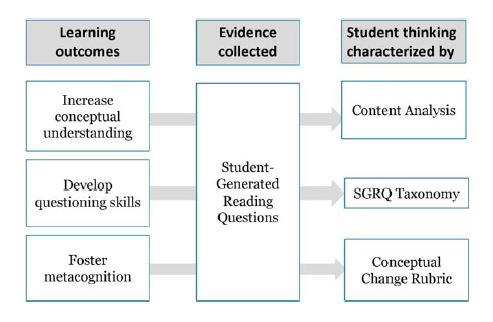 There’s no arguing with Ryan’s (2009) observation that “coming to class prepared and with some background knowledge transforms students from passive to active learners” (para. 3). But how to get our students to this state of “transformation readiness” is an age-old issue challenging most instructors throughout their careers. I’m sure the struggle also extends to my own students, who are aspiring or practicing language-teaching professionals juggling multiple personal, academic, and professional demands. Research shows that reasons for not completing reading assignments also include factors such as reading comprehension, low student self-confidence, and lack of interest in the topic (e.g., Lei, Bartlett, Gorney, & Herschbach, 2010).
There’s no arguing with Ryan’s (2009) observation that “coming to class prepared and with some background knowledge transforms students from passive to active learners” (para. 3). But how to get our students to this state of “transformation readiness” is an age-old issue challenging most instructors throughout their careers. I’m sure the struggle also extends to my own students, who are aspiring or practicing language-teaching professionals juggling multiple personal, academic, and professional demands. Research shows that reasons for not completing reading assignments also include factors such as reading comprehension, low student self-confidence, and lack of interest in the topic (e.g., Lei, Bartlett, Gorney, & Herschbach, 2010).
CURRENT ARTICLE • September 25
OTHER RECENT ARTICLES
 Enter the term “group work” into a Google search, and you’ll find yourself bombarded with dozens of hits clustered around definitions of group work, benefits of group work, and educational theories underpinning group work. If you dig a little deeper into the search results, however, you’ll find that not all of the pages displayed under the moniker of “group work” describe the same thing. Instead, dozens of varieties of group learning appear. They all share the common feature of having students work together, but they have different philosophies, features, and approaches to the group task.
Enter the term “group work” into a Google search, and you’ll find yourself bombarded with dozens of hits clustered around definitions of group work, benefits of group work, and educational theories underpinning group work. If you dig a little deeper into the search results, however, you’ll find that not all of the pages displayed under the moniker of “group work” describe the same thing. Instead, dozens of varieties of group learning appear. They all share the common feature of having students work together, but they have different philosophies, features, and approaches to the group task.
Using a Discourse-Community-Knowledge Framework to Design Writing Assignments
 The educational benefits of writing are undeniable. Challenging students to write about our disciplines for diverse purposes and audiences deepens learning and promotes critical thinking. And so we put a great deal of effort into creating writing assignments that do not merely ask students to report back to us the content we have “delivered," but instead require them to explore course content and address a target audience that has specific needs.
The educational benefits of writing are undeniable. Challenging students to write about our disciplines for diverse purposes and audiences deepens learning and promotes critical thinking. And so we put a great deal of effort into creating writing assignments that do not merely ask students to report back to us the content we have “delivered," but instead require them to explore course content and address a target audience that has specific needs.
The interest inventory is a simple tool to help you acquaint yourself with your students. Unlike the many icebreakers, the interest inventory is a paper-based activity and students do not have to give answers aloud in front of class. The interest inventory, therefore, helps you get to know your students privately and allows you to ask different questions than you would during oral introductions.
Read More › Getting students to do their assigned reading is a struggle. Most teachers don’t need anyone to tell them what the research pretty consistently reports. On any given day, only 20 to 30 percent of the students arrive at class having done the reading. Faculty are using a variety of approaches to up that percentage: quizzes (announced, unannounced, online), assignments that require some sort of written response to the reading, reading journals, a variety of optional reading support materials, and calling on students to answer questions about the reading. Which of these approaches work best?
Getting students to do their assigned reading is a struggle. Most teachers don’t need anyone to tell them what the research pretty consistently reports. On any given day, only 20 to 30 percent of the students arrive at class having done the reading. Faculty are using a variety of approaches to up that percentage: quizzes (announced, unannounced, online), assignments that require some sort of written response to the reading, reading journals, a variety of optional reading support materials, and calling on students to answer questions about the reading. Which of these approaches work best?
We have all had the experience of having students sitting in our classes, looking directly at us, and knowing, just knowing, that they are not paying the least bit of attention to what we are talking about or what the topic of the day is. In fact, if we don’t see this in our classes (and I believe we all do…it’s just that some of us don’t wish to admit it), all an instructor has to do is review assignments, quizzes, or exams to find evidence that students don’t understand key concepts that were highlighted as “really important” or “critical” to understanding the material.
Read More ›Editor’s note: The following is an excerpt from Student-Generated Reading Questions: Diagnosing Student Thinking with Diverse Formative Assessments, Biochemistry and Molecular Biology Education, 42 (1), 29-38. The Teaching Professor Blog recently named it to its list of top pedagogical articles.
Read More › The flipped learning model of instruction has begun to make the transition from an educational buzzword to a normative practice among many university instructors, and with good reason. Flipped learning provides many benefits for both faculty and students. However, instructors who use flipped learning soon find out that a significant amount of work is sometimes necessary to win students over to this way of conducting class. Even when the benefits of flipped learning are made clear to students, some of them will still resist. And to be fair, many instructors fail to listen to what students are really saying.
The flipped learning model of instruction has begun to make the transition from an educational buzzword to a normative practice among many university instructors, and with good reason. Flipped learning provides many benefits for both faculty and students. However, instructors who use flipped learning soon find out that a significant amount of work is sometimes necessary to win students over to this way of conducting class. Even when the benefits of flipped learning are made clear to students, some of them will still resist. And to be fair, many instructors fail to listen to what students are really saying.
 I love stories; stories about life, our personal experiences, the happy and the sad. Stories teach us about how the world sometimes works and how we relate to it. When I was young, I used to love to hear my parents talk about their experiences when they were young. Their stories gave me the opportunity to learn not only about their lives, but also gave me a better understanding of my culture, the traditions of my family, and its history. In a sense, these stories gave me a better understanding of myself. Stories put into context information that would otherwise remain fragmented, pieces of this and that, thrown into a catchall closet in which items are tossed and usually hopelessly lost.
I love stories; stories about life, our personal experiences, the happy and the sad. Stories teach us about how the world sometimes works and how we relate to it. When I was young, I used to love to hear my parents talk about their experiences when they were young. Their stories gave me the opportunity to learn not only about their lives, but also gave me a better understanding of my culture, the traditions of my family, and its history. In a sense, these stories gave me a better understanding of myself. Stories put into context information that would otherwise remain fragmented, pieces of this and that, thrown into a catchall closet in which items are tossed and usually hopelessly lost.
 “What is one of your pet peeves?” That question is among those I might ask my students at the start of nearly every class session as a way of taking attendance. Asking about pet peeves always elicits a lively, engaged discussion. Faces light up, and everyone wants to share their own personal irritants. This engagement never happens when taking attendance is nothing more than reading names from the roster with an answer of “Here” or “Present.”
“What is one of your pet peeves?” That question is among those I might ask my students at the start of nearly every class session as a way of taking attendance. Asking about pet peeves always elicits a lively, engaged discussion. Faces light up, and everyone wants to share their own personal irritants. This engagement never happens when taking attendance is nothing more than reading names from the roster with an answer of “Here” or “Present.”






